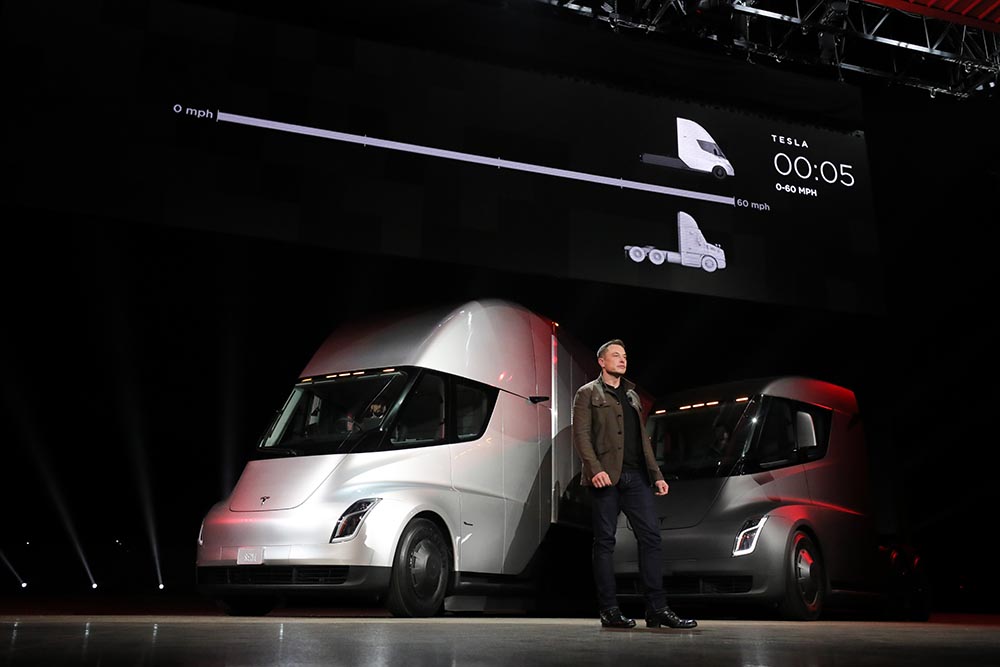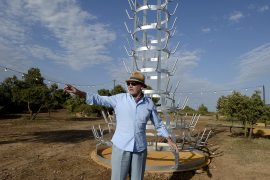[dropcap letter=”E”]
nlightened, visionary, genius, controversial, egocentric… These are just some of the adjectives attributed to Tesla’s founder, Elon Musk. He probably shares, to a certain extent, part of all of these attributes because, after all, someone who aims to change the world leaves no-one indifferent. Each endeavour set up by this physicist, born in South Africa in 1971, seeks to revolutionize life as we know it, either proposing civilian transport to Mars, expanding solar energy or solving traffic problems through ultra-fast tunnels and platforms. It was not by chance that in 2003, when he founded his own motor company, he decided to name it after the inventor of an induction motor that ran on alternating current, Nikola Tesla. With this move, he not only paid tribute to the inventor but also marked his own declaration of intent. Tesla was designed to lead the way of the four-wheel industry into electrification, and the mid-term master plan to democratise the use of a technology that is still too expensive for the general public.
In fact, speculating on Musk’s defeat has become a sport of sorts that is gaining more and more adepts. Just a few days ago, the bearish fund Vila Capital engaged in speculation over a supposed bleak future for the company and its founder, holding that Tesla would go into liquidation by 2019, and that Musk would end up facing prison sentences for lying and giving false expectations to their investors.
In a few years on the market, Tesla has established itself as a benchmark in the motor industry, not so much on account of its sales turnover, still low, but because of the expectations raised. Likewise Musk, like other ground-breaking entrepreneurs as the late Steve Jobs (Apple) or Mark Zuckerberg (Facebook), has forged himself a place in the international arena, also thanks to his personality –his employees are said to prefer sending him e-mails than dealing with him face to face– and his famous communications sent out over twitter. He has 22.4 million followers in his twitter account, and it is this media that he used a few weeks ago to trigger a financial turmoil as he speculated on the idea of excluding Tesla from the New York stock exchange. A few months earlier, his April Fools’ bombshell tweet announcement made news headlines and struck panic on the markets on “acknowledging” the company’s insolvency. This was his ironic reply to those who question his future plans.
In fact, speculating on Musk’s defeat has become a sport of sorts that is gaining more and more adepts. Just a few days ago, the bearish fund Vila Capital engaged in speculation over a supposed bleak future for the company and its founder, holding that Tesla would go into liquidation by 2019, and that Musk would end up facing prison sentences for lying and giving false expectations to their investors. But, is the situation of Musk’s motor company so frail? Since the company’s earliest models broke into the market (models S and X), produced in small series and sold at “near-collector’s price”, Musk’s overriding priority has been to democratise the electric technology for cars at affordable prices, and with a higher production. A true and self-demanding perfectionist, Musk has gone so far as to involve himself in the job of his engineers to design and improve bits and pieces while directing the company.
The brand’s big hope was the commercial launch of its Model 3, the first of a more affordable series for the middle class. Although the baseline $35,000 promised by the entrepreneur have ended up being a few more, Model 3 has established itself as the sales leader for electric vehicles in the American market, with sales nearing 50% in July. In a recent interview with a popular youtuber, best known for his technology-focused videos, Marques Brownlee, Musk was hoping to be able to offer this model for $22,000 within the next three or four years.
But the pressure is too high as, right now, Tesla is failing to meet production targets, and time seems to play against Musk. The Freemont (California) factory is facing problems not only to increase its capacity; the company’s after-sales service is making lose the patience of his customers on account of its slow servicing and shortage of spare parts. Musk himself admitted in an interview for The New York Times that this 2018 is being the “worst” since the company was founded, but he did not deny that the worst could be yet to come. There is a reason behind this pessimistic forecast. The list of investors who claim his head is growing every day, and many in Wall Street see Musk as a major liability for Tesla’s future because of his erratic and unstable personality habits. His confession that he often sleeps in the factory and hardly goes out has not helped building up confidence in him. And the last video of Musk smoking Marijuana -this drug is legal in California- during an interview for an online media outlet is much more than many at Tesla are willing to endure. Therefore, no one seems to be surprised that the flight of senior officials in the automotive industry is a constant -more than two dozen executives have left the ship in the last two years- and that the financial circles speculate on the possibility that Musk might well be following Steve Jobs’ track, when in 1985 he was ‘invited’ to step down from Apple’s CEO, the company he had created, because he was considered a liability for the brand’s future.
Rumours of all types grow while Wall Street officials are running an investigation on his 7th August bombshell tweet announcing that he was considering taking the company private and that he had funding secured. If this investigation proves that he lied, Musk could be facing serious legal consequences. Parallel to this, Tesla’s CEO seems to have taken a new top executive on board to become Musk’s right hand and, should things get nasty, be able to step in and take over the reins of the company straightaway. However, other shareholders warn against the impact of ousting Musk from the company, as the company capitalization is now worth $54,000 M, just above large four-wheel sector companies, topping General Motors or Ford.
Pending the opening of its new China manufacturing plant (due in 2023) and pending the possible location for its European factory, Tesla’s future depends on its capacity to increase production and reduce costs to, eventually, sell more cars. This is not an easy path to take but some believe that it will be equally difficult to keep Musk on top. On the other hand, the South African is Tesla’s soul, after all. This should count for something and it is certainly a strong argument in his favour. Actually, Apple did not achieve much without Jobs, and it was only on his return that the brand recovered industry leadership with the launch of iphone.




















